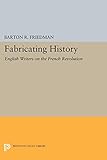Fabricating History : English Writers on the French Revolution / Barton R. Friedman.
Material type: TextSeries: Princeton Legacy Library ; 896Publisher: Princeton, NJ : Princeton University Press, [2014]Copyright date: ©1988Edition: Course BookDescription: 1 online resource (250 p.)Content type:
TextSeries: Princeton Legacy Library ; 896Publisher: Princeton, NJ : Princeton University Press, [2014]Copyright date: ©1988Edition: Course BookDescription: 1 online resource (250 p.)Content type: - 9780691606972
- 9781400859344
- English literature -- French influences
- English literature -- 19th century -- History and criticism
- Historical fiction, English -- History and criticism
- Literature and history -- France
- Napoleonic Wars, 1800-1815 -- Historiography
- Napoleonic Wars, 1800-1815 -- Literature and the wars
- Revolutions in literature
- War in literature
- LITERARY CRITICISM / European / English, Irish, Scottish, Welsh
- 820/.9/358 19
- PR129.F8 F75 1988
- online - DeGruyter
- Issued also in print.
| Item type | Current library | Call number | URL | Status | Notes | Barcode | |
|---|---|---|---|---|---|---|---|
 eBook
eBook
|
Biblioteca "Angelicum" Pont. Univ. S.Tommaso d'Aquino Nuvola online | online - DeGruyter (Browse shelf(Opens below)) | Online access | Not for loan (Accesso limitato) | Accesso per gli utenti autorizzati / Access for authorized users | (dgr)9781400859344 |
Frontmatter -- Contents -- Acknowledgments -- A Note on Texts -- Introduction -- ONE Fabricating History -- TWO. Through Forests of Eternal Death: Blake and Universal History -- THREE. Lives of Napoleon: Scott and Hazlitt at Pens7 Points -- FOUR. At the Conflux of Two Eternities: Carlyle's French Revolution -- FIVE. Antihistory: Dickens' ATale of Two Cities -- SIX. Proving Nothing: Hardy's The Dynasts -- Conclusion (Mainly about Conclusions) -- Notes -- Index
restricted access online access with authorization star
http://purl.org/coar/access_right/c_16ec
Barton Friedman demonstrates the ways in which English men of letters in the nineteenth century attempted to grasp the dynamics of history and to fashion order, however fragile, out of its apparent chaos. The authors he discusses--Blake, Scott, Hazlitt, Carlyle, Dickens, and Hardy--found in the French Revolution an event more compelling as a paradigm of history than their own "Glorious Revolution." To them the French Revolution seemed universally significant--a microcosm, in short. For these writers maintaining the distinction between "history" and "fiction" was less important than making sense of epochal historical events in symbolic terms. Their works on the French Revolution and the Napoleonic Wars occupy the boundary between history and fiction, and Fabricating History advances the current lively discussion of that boundary.At the same time, this work explores questions about narrative strategies, as they are shaped by, or shape, events. Narratives incorporate the ideological and metaphysical preconceptions that the authors bring with them to their writing. "This is not to argue," Professor Friedman says, "that historical narratives are only about the mind manufacturing them or, more narrowly yet, about themselves as mere linguistic constructs. They illumine both the time and place they seek to re-create and, if by indirection, the time and place of the mind thinking them into being."Originally published in 1988.The Princeton Legacy Library uses the latest print-on-demand technology to again make available previously out-of-print books from the distinguished backlist of Princeton University Press. These editions preserve the original texts of these important books while presenting them in durable paperback and hardcover editions. The goal of the Princeton Legacy Library is to vastly increase access to the rich scholarly heritage found in the thousands of books published by Princeton University Press since its founding in 1905.
Issued also in print.
Mode of access: Internet via World Wide Web.
In English.
Description based on online resource; title from PDF title page (publisher's Web site, viewed 30. Aug 2021)


